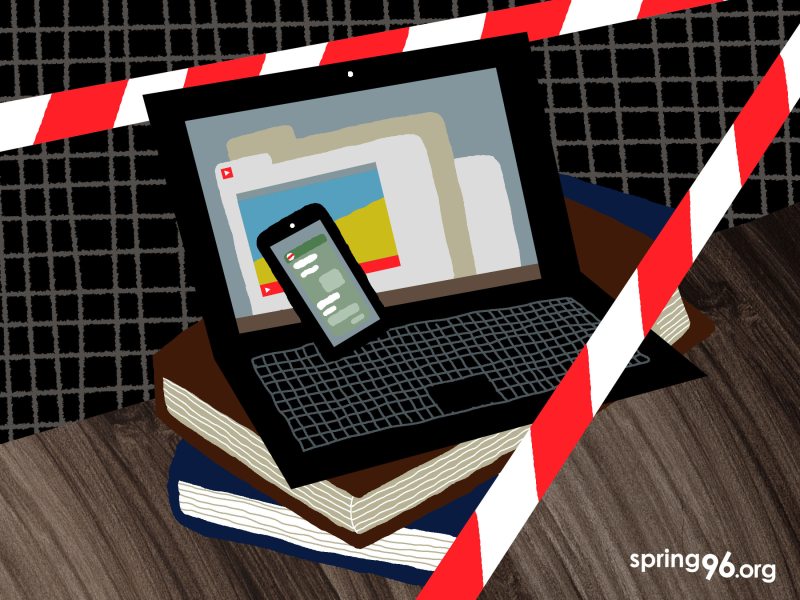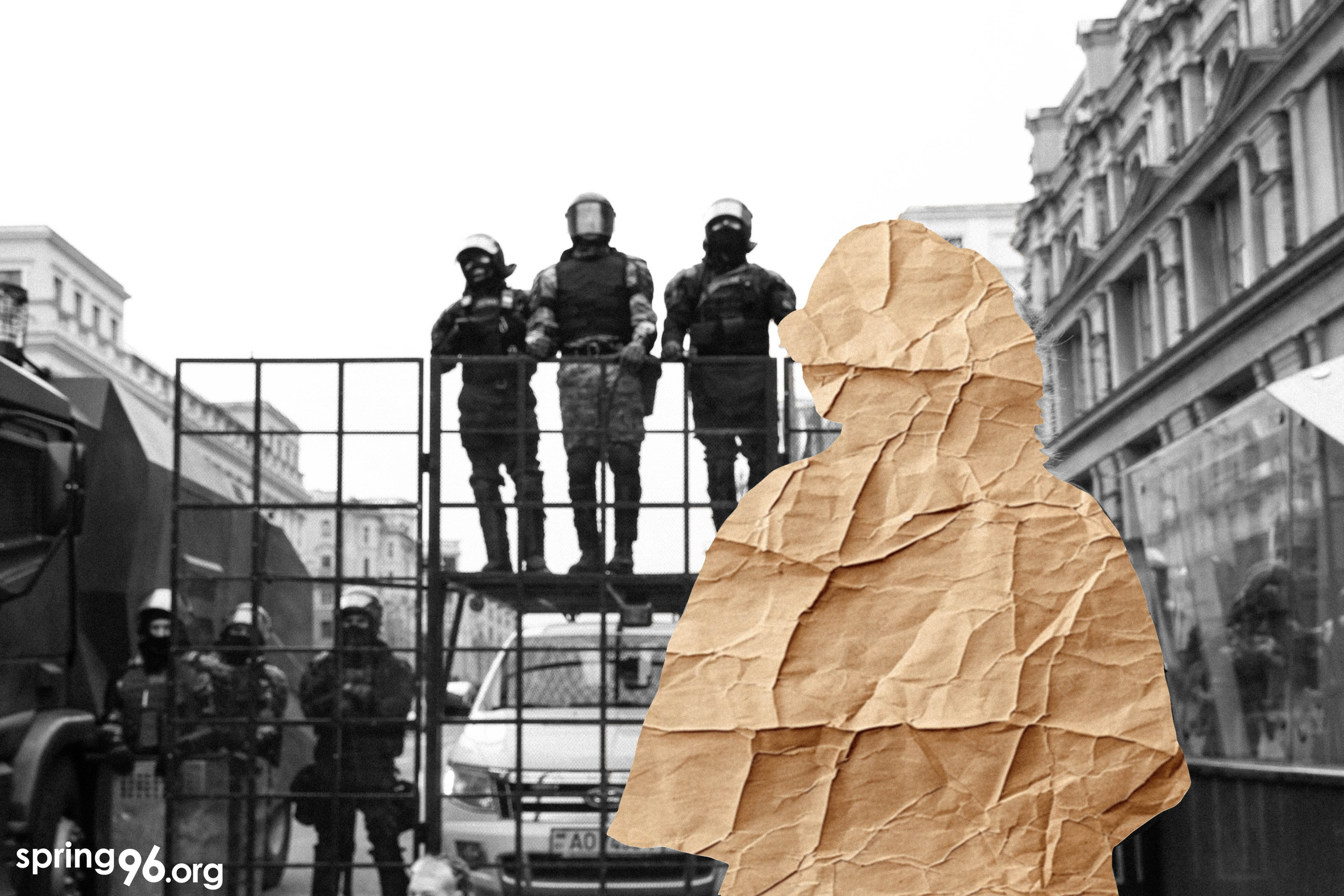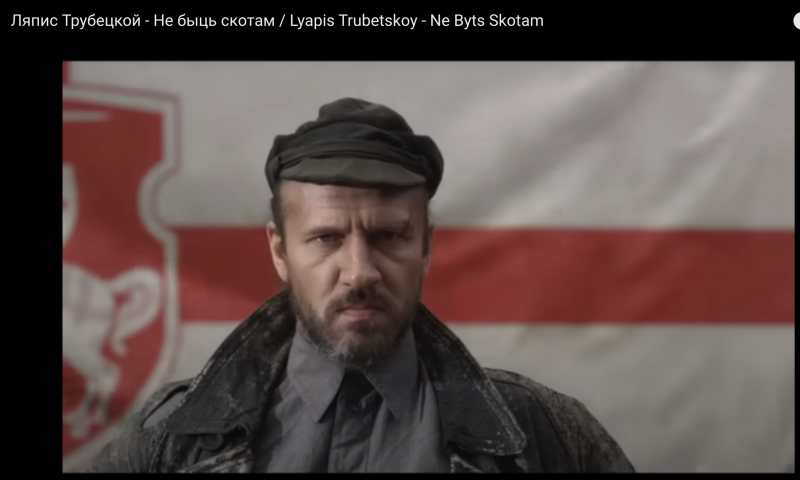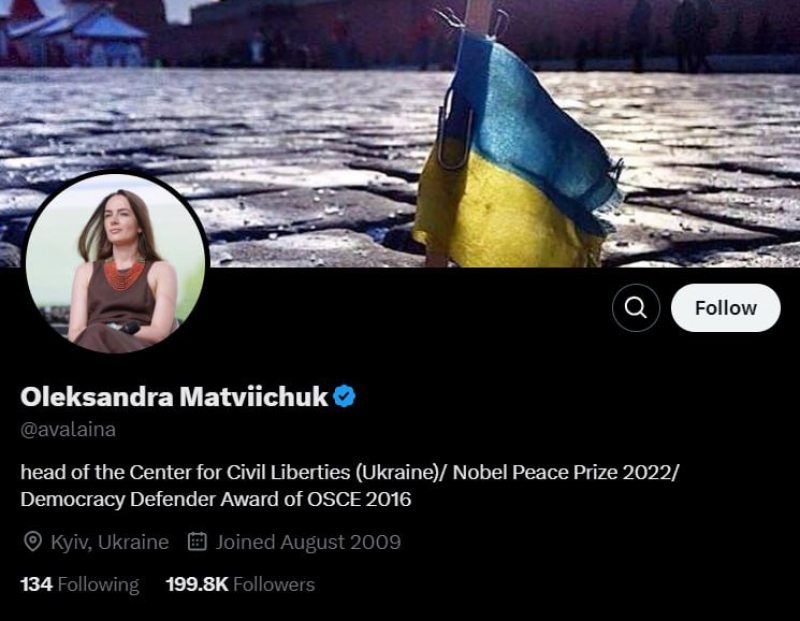40.5% of all the "extremist" rulings were issued in 2024. What was recognized as "extremist" last year
In 2024, Belarusian courts issued as many as 1,444 decisions recognizing information, symbols, paraphernalia, and printed publications as "extremist materials," which is 40.5% of the total number of decisions since 2008. The Lukashenka regime recognizes as "extremist" the websites and social media accounts of independent media, large Telegram channels, various communities, both in Belarus and abroad, books, music videos, songs, as well as social media pages of influencers and ordinary citizens. Viasna reports how in 2024 the Belarusian courts were zealous with decisions on recognizing materials as "extremist" and also recalls which information received an "extremist" status.

How many trials have been conducted on recognizing materials as "extremist"?
In 2024, the courts of Belarus adopted 1,444 decisions on the recognition of information as "extremist". A total of 3,567 such decisions have been made since 2008. Thus, 40.5% of the total number of decisions since 2008 were made last year alone. For comparison, in 2023, the courts issued 888 decisions on the recognition of materials as "extremist", and 637 in 2022. Several information sources can be recognized in one decision. Thus, as of November 1, 2024, 6565 items were added to the republican list of extremist materials.
The courts of the Minsk region adopted 716 decisions in 2024; 246 were adopted in the Brest region and 121 in the Homieĺ region.

"The conveyor belt of undisguised censorship." What materials are recognized as "extremist" in Belarus
An application for recognition of symbols and paraphernalia (except Nazi symbols and paraphernalia) and information as extremist materials is submitted to the court by the subject of countering extremism or the prosecutor, and the court examines it in special proceedings. The processes take place behind closed doors, and the content of the materials and the reasons for the recognition are not disclosed. It is known from the "list of extremist materials" that three decisions were overturned last year.
Together with the Viasna legal service, we explained how materials are recognized as "extremist" in Belarus:
The first trial last year on the recognition of materials as "extremist" took place on January 3, 2024. Then the Tsentraĺny District Court recognized as "extremist" a VKontakte community luka.zone.
Prosecution for "extremist materials"
Article 19.11 of the Administrative Code stipulates administrative liability for reposts, sharing in personal messages, and subscriptions in some social media to materials included in the "republican list of extremist materials".
Article 19.11. Distribution, manufacture, storage, and transportation of information products containing calls for extremist activities or promoting such activities1. Distribution of information products containing calls for extremist activities or promoting such activities, as well as the manufacture, storage, or transportation for the purpose of distributing of such information products entail the imposition of a fine of up to 20 basic units [250 euros in 2025] with confiscation of the object of an administrative offense, for an individual entrepreneur — from 20 to 50 basic units [to 630 euros] with confiscation of the object of an administrative offense, and for a legal entity — from 50 to 200 basic units [to 2,500 euros] with confiscation of the object of an administrative offense. 2. Distribution of information products included in the republican list of extremist materials, as well as the manufacture, publication, storage, or transportation for the purpose of distributing of such information products entail the imposition of a fine of 10 to 30 basic units [from 125 to 375 euros] with confiscation of the object of an administrative offense, as well as devices and means of committing the specified violation, or without confiscation of such devices and means, or community service with confiscation of the object of an administrative offense, as well as devices and means of committing the specified violation, or without confiscation of such devices and means, or administrative arrest with confiscation of the object of an administrative offense, as well as devices and means of committing the said, an individual entrepreneur is fined from 50 to 100 basic units [to 1,250 euros] with confiscation of the object of an administrative offense, as well as devices and means of violation, or without confiscation of such devices and means, and a legal entity is fined from 100 to 500 basic units [to 6,300 euros], with or without confiscation of the object of the administrative offense, as well as devices and means of committing the specified violation. |
According to information from Viasna, in 2024, at least 2,000 people were brought to administrative responsibility under Article 19.11 of the Administrative Code. This figure is incomplete and may be much higher, as the regime is increasingly hiding the repression in the country.
In the spring of 2023, Viasna human rights defenders prepared a report titled Restrictions on freedom of expression under the pretext of combating extremism and terrorism which also raised the issue of persecution for "extremist materials."
"Charges under Article 19.11 of the Administrative Code have become a universal tool of arbitrary repression, in the form of administrative arrest among other punishments, which is often used several times in a row, for example, for several identified materials on social media. In addition, courts pass sentences under Article 19.11 of the Administrative Code concerning information materials stored and not publicly displayed, and recognized as extremist. 'Having the purpose of distribution' is then incriminated without objective grounds, which adds arbitrariness to such restrictions," the lawyers noted.
Human rights activists recall what was recognized as "extremist materials" in 2024.
Yanka Kupala's poem Who are you?
On January 26, the court recognized the lyrics and music video of the song Nie byc skotam (Not to be cattle) by Lyapis Trubetskoy as "extremist materials." It is peculiar that the lyrics of this song are a poem Who are you? by a classic Belarusian author Yanka Kupala. It was first published on February 1, 1908, in the newspaper Nasha Niva.
More than ten books
On March 28, the book Military Symbols of Belarusians. Flags and Uniforms by Viktar Liakhor. The relevant decision was made by the Tsentraĺny District Court of Minsk. In 2021, the Ministry of Culture ordered the book to be removed from libraries. At that time, the agency argued that it "contains unreliable information containing elements of anti-state propaganda."
On June 20, three books by political prisoner Pavel Seviarynets, who was sentenced to seven years in a penal colony, were declared "extremist." Those were the books: Heart of Stone; I Love BELARUS: 200 Phenomena of the National Idea;and Belarusalem. Book Two. The Heart of Light. The relevant decision was made by the Kastryčnicki District Court of Minsk.
On August 27, three books by historian Ihar Melnikau were included in the "list of extremist materials": The Odyssey of a Paleshuk; The Forgotten Corps: the History of the Polish Army in Babrujsk in 1918, 1919–1920; On the "Border of Civilizations". Pages of the History of the Pre-war Soviet-Polish Border in Belarus. The author and historian Ihar Melnikau was sentenced to four years in a penal colony in September for an interview with Euroradio under Part 1 of Article 361-4 of the Criminal Code (facilitating extremist activities).
Yazep Yanushkevich's preface to the publication of the works of Vintsent Dunin-Martsinkevich has been recognized as "extremist" twice in two years. Dunin-Martsinkevich's two-volume work was recognized as "extremist materials" in November 2023 by the court of the Žytkavičy district. Later, the decision of the district court was overturned by the Presidium of the Homieĺ Regional Court on March 11, 2024. But on May 24, 2024, the same court of the Žytkavičy district recognized Yazep Yanushkevich's preface to the collection of works by Vintsent Dunin-Martsinkevich as "extremist materials."
In May, at the request of the Minsk city Prosecutor's office, the information products of the print publications Selected Works by Vaclav Lastovsky (1997) and Selected Works by Ales Petrashkevich (2017), published within the framework of the Belaruski Knihazbor project, were recognized by the court as "extremist materials".
On December 17, Belarus recognized as "extremist" a book about the Russian politician Boris Nemtsov The Successor. The Story of Boris Nemtsov and the Country in Which He Did Not Become President by Mikhail Fishman. The relevant decision was made by the Tsentraĺny District Court of Minsk.
Songs and music videos

At the end of January last year, the music video and lyrics of the song Not to Be Cattle by Lyapis Trubetskoy became "extremist". This decision was made by the Barysaŭ District Court.
On February 21, the song 10 Million Slaves by the band Daj Darohu was recognized as "extremist". The relevant decision was made by the Homieĺ District Court. Five months later, on June 24, according to the statement of the prosecutor of the Bešankovičy district, the information on the YouTube channel of the band Daj Darohu was recognized by the court as "extremist materials."
On April 22, The Song of a Cheerful Belarusian by AP$ENT was recognized as "extremist". The relevant decision was made by the Homieĺ District Court.
On August 6, the Leninski District Court of Mahilioŭ declared the music video for the poem There is Trouble in my Homeland by Belarusian poet Aliaksandr Bal to be "extremist".
Personal social media pages of former political prisoners and influencers
In total, 348 pages on Instagram and 61 on x were recognized as "extremist" in 2024. These are social media pages of various initiatives, media, and communities, as well as personal pages of both Belarusians and foreigners. During the election campaign in Belarus, the social media pages of former political prisoners and influencers have begun to be recognized as "extremist" even more.
For example, among them are the Instagram pages of former political prisoners Volha Harbunova, Alana Gebremariam, Siarhei Petrukhin, Aliaksandr Kabanau, and Aleh Baradzin. Volha Takarchuk's TikTok is also recognized as "extremist."
The Instagram page of political prisoner Uladzislau Savin, who has been behind bars for more than three years, was recognized as "extremist". The relevant decision was made by the Pukhavičy District Court of the Minsk region on July 12.
Uladzislau is a producer and blogger. He was accused of participating in three marches in 2020 and organizing protests using videos on his Instagram page, as well as promising more than 100 people to participate in the first reality TV shows in Belarus in 2015–2016, but not fulfilling his promise. For this, he was sentenced to eight years in a medium security penal colony.
On November 27, the Instagram page of Vadzim Yermashuk, a former political prisoner and blogger from Hrodna, was declared "extremist". The corresponding decision was made by Judge Artur Leshik in the Leninski District Court of Hrodna. At the same time, before the start of the trial, the blogger deleted his page and left Belarus. The political prisoner blogger was released on June 29, having fully served his sentence. He was sentenced to three years of imprisonment for "the desecration of state symbols" (Article 370 of the Criminal Code) and "insulting Lukashenka" (Article 368 of the Criminal Code).
In 2024, the Instagram pages of human rights defenders Andrei Stryzhak, lawyer Maryia Kolesava-Hudzilina, media manager Ales Chakhouski, artist Uladzimir Tsesler, actress Krystsina Drobysh, and singer Sveta Ben, among others, were recognized as "extremist".
TikTok
In 2024, the Belarusian courts recognized 146 TikTok pages as "extremist." For example, former political prisoner journalist Sasha Ivulin and stand-up comedian Slava Kamisarenka received "extremist" status on TikTok.
Social media pages of foreign human rights defenders and organizations

In September, the Instagram page of the independent German-Swiss non-governmental organization Libereco PHR was declared "extremist" in Hrodna.
On October 2, the Telegram page of the Russian Memorial was declared "extremist" in Belarus. The relevant decision was made by the Court of Baranavičy and Baranavičy District.
On December 18, by a decision of the Tsentraĺny District Court of Minsk in Belarus, the X page of the 2022 Ukrainian Nobel Peace Prize laureate Oleksandra Matviichuk was declared "extremist".Almost 200,000 people have subscribed to the Ukrainian human rights activist's page.
19 "extremist" human rights investigations and reports
On July 22, 2024, the Tsentraĺny District Court of Minsk declared the website of the International Committee for the Investigation of Torture to be "extremist." In addition, reports and investigations were recognized as such, including one titled Frunzenski Police Department of Minsk. Torture of Detainees in August 2020; Torture in Belarus. Report of Non-governmental Organizations on the Eve of the Adoption by the UN Committee Against Torture of the List of Questions to the Republic of Belarus; Belarus: Crimes Against Humanity. Legal Assessment of the Crimes of A. Lukashenka' Regime; GUBOPiK is the Punitive Unit of the Regime for Combating Dissent; Torture of LGBTQ+ People and the Regime's Homophobic Policy; Belarusian Participation in the War in Ukraine: the Regime and the People. We Protested for Peace and Ended up in Prison. Anti-war Actions of Citizens and the Reaction of the Belarusian Regime.
Several Telegram channels and bot initiatives that have helped detained Belarusians, as well as a website for sending letters pismo.bel

In October last year, the "list of extremist materials" included the Telegram chat Coordination of assistance in Žodzina and the channel Lists of Detainees (Police Department+Courts+Žodzina+Akrescina) which were recognized as an "extremist formation" among others. After the protests in 2020, these initiatives assisted detainees and their relatives.
On November 12, the Partyzanski District Court of Minsk recognized the website of pismo.bel initiative as "extremist materials", as well as its social media pages. The service helped to send letters to prisoners "using just a computer or a phone." Later, it stopped opening and became unavailable in Belarus and abroad. After some time, it became known that three residents of Žodzina had been placed in jail, since, according to the KGB, they were related to the pismo.bel initiative.
Page with Belarusian memes on Instagram
BelMemes account has more than 1,700 subscribers. The Leninski District Court of Hrodna gave the page the "extremist" status on September 18.
Communities for the promotion of Belarusian language
On June 25, the Leninski District Court of Hrodna declared 26 Mova Na Nova (Speaking Anew) groups in various social media in Belarus and abroad to be "extremist."
In August, the Leninski District Court of Mahilioŭ recognized the VKontakte group and the Telegram channel which published the most popular articles in Belarusian on Wikipedia as "extremist".
Animal welfare group Help for Homeless Animals, Luniniec
The relevant decision was made by the Luninecki District Court on November 13.
The website of a project against child abduction
On April 8, the Tsentraĺny District Court of Minsk recognized the website of the Action Against Child Abduction project, actionagainstchildabduction.com, as "extremist materials." According to the website, the project's mission is to protect children from abduction.
An article in a German newspaper about the death of Ales Pushkin
On March 25, the Tsentraĺny District Court of Minsk recognized two articles by the German weekly newspaper Die Tageszeitung as "extremist materials": The Fraternal People as Cannon Fodder, (on whether Lukashenka decides to send troops to Ukraine) and Our Pushkin (on the death of political prisoner Ales Pushkin).

















